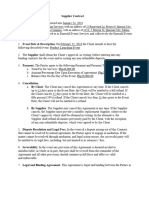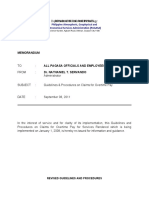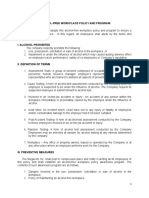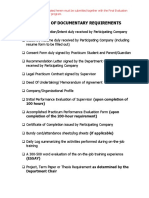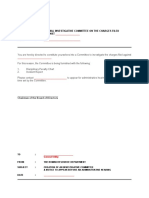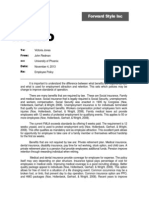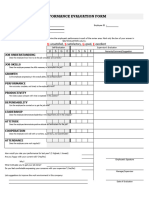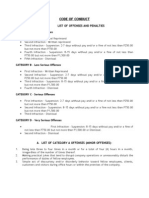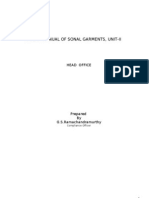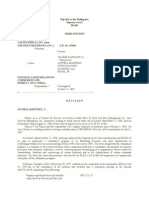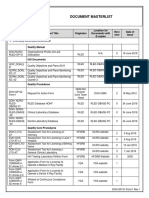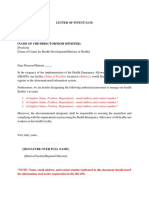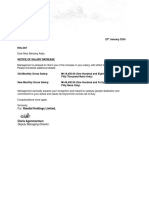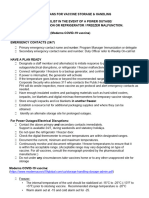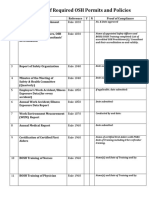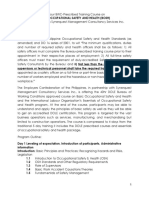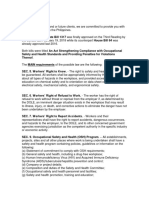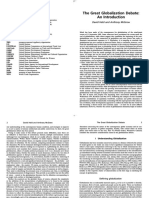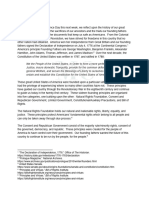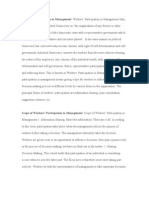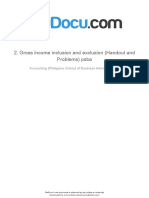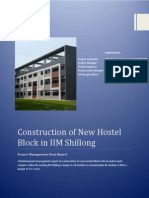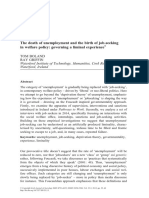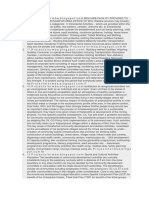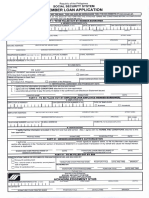0 ratings0% found this document useful (0 votes)
414 viewsDepartment Order 56-03
Department Order 56-03
Uploaded by
robinrubinaThis document outlines changes to the priorities and implementation of the Family Welfare Program (FWP) managed by the Department of Labor and Employment in the Philippines. Key points:
1. The FWP's focus shifts from promoting family planning to providing broader family welfare services for workers across 10 dimensions, including reproductive health, education, nutrition, and housing.
2. Reproductive health is defined broadly to include family planning, maternal and child care, reproductive cancers, and adolescent health.
3. Employers with over 200 workers must form Family Welfare Committees to plan and implement in-plant family welfare programs. The Department of Labor will provide support and oversee implementation.
Copyright:
© All Rights Reserved
Available Formats
Download as PDF, TXT or read online from Scribd
Department Order 56-03
Department Order 56-03
Uploaded by
robinrubina0 ratings0% found this document useful (0 votes)
414 views3 pagesThis document outlines changes to the priorities and implementation of the Family Welfare Program (FWP) managed by the Department of Labor and Employment in the Philippines. Key points:
1. The FWP's focus shifts from promoting family planning to providing broader family welfare services for workers across 10 dimensions, including reproductive health, education, nutrition, and housing.
2. Reproductive health is defined broadly to include family planning, maternal and child care, reproductive cancers, and adolescent health.
3. Employers with over 200 workers must form Family Welfare Committees to plan and implement in-plant family welfare programs. The Department of Labor will provide support and oversee implementation.
Original Description:
RATIONALIZING THE IMPLEMENTATION OF FAMILY WELFARE PROGRAM (FWP) IN DOLE
Copyright
© © All Rights Reserved
Available Formats
PDF, TXT or read online from Scribd
Share this document
Did you find this document useful?
Is this content inappropriate?
This document outlines changes to the priorities and implementation of the Family Welfare Program (FWP) managed by the Department of Labor and Employment in the Philippines. Key points:
1. The FWP's focus shifts from promoting family planning to providing broader family welfare services for workers across 10 dimensions, including reproductive health, education, nutrition, and housing.
2. Reproductive health is defined broadly to include family planning, maternal and child care, reproductive cancers, and adolescent health.
3. Employers with over 200 workers must form Family Welfare Committees to plan and implement in-plant family welfare programs. The Department of Labor will provide support and oversee implementation.
Copyright:
© All Rights Reserved
Available Formats
Download as PDF, TXT or read online from Scribd
Download as pdf or txt
0 ratings0% found this document useful (0 votes)
414 views3 pagesDepartment Order 56-03
Department Order 56-03
Uploaded by
robinrubinaThis document outlines changes to the priorities and implementation of the Family Welfare Program (FWP) managed by the Department of Labor and Employment in the Philippines. Key points:
1. The FWP's focus shifts from promoting family planning to providing broader family welfare services for workers across 10 dimensions, including reproductive health, education, nutrition, and housing.
2. Reproductive health is defined broadly to include family planning, maternal and child care, reproductive cancers, and adolescent health.
3. Employers with over 200 workers must form Family Welfare Committees to plan and implement in-plant family welfare programs. The Department of Labor will provide support and oversee implementation.
Copyright:
© All Rights Reserved
Available Formats
Download as PDF, TXT or read online from Scribd
Download as pdf or txt
You are on page 1of 3
Republic of the Philippines
DEPARTMENT OF LABOR AND EMPLOYMENT
Intramuros, Manila
DEPARTMENT ORDER NO. 56-03
Series of 2003
SECTION 1. Basis. Pursuant to Article 134 of the Labor Code and its
Implementing Rules and Regulations, and in line with the Departments
commitments to the 1995 International Conference on Women in Beijing, the 1999
International Conference on Population and Development Programme of Action, the
Philippine Population Management Program, the Directional Plan for 2002-2004, and
the Philippine Plan for Nutrition 1999-2004, the priorities of the Family Welfare
Program (FWP) are hereby modified.
SECTION 2. New Priorities of the Family Welfare Program. From its original thrust
of promoting family planning, the program will shift its focus to providing family
welfare services to workers. The ten dimensions of the program which will serve as
guide to both labor and management in the implementation of programs and projects
consist of the following:
a) Reproductive Health and Responsible Parenthood;
b) Education/ Gender Equality;
c) Spirituality or Value Formation;
d) Income Generation/Livelihood/Cooperative;
e) Medical Health Care;
f) Nutrition;
g) Environment Protection, Hygiene and Sanitation;
h) Sports and Leisure;
i) Housing; and
j) Transportation.
SECTION 3. Reproductive Health. The Philippines, as signatory to the Programme
of Action of the 1994 International Conference on Population and Development
subscribes to the consensus of broadening population policies and programs beyond
family planning.
Reproductive health shall refer to the state of complete physical, mental and social well-
being and not merely the absence of diseases or infirmity, in all matters relating to the
reproductive system and its functions and processes. Furthermore, Reproductive Health
Care is defined as interventions or services to include, but are not limited to the
following concerns:
RATIONALIZING THE IMPLEMENTATION OF
FAMILY WELFARE PROGRAM (FWP) IN DOLE
a) Family Planning (FP);
b) Maternal and Child Health and Nutrition (MCHN);
c) Prevention and Management of Abortion and its Complications (PMAC);
d) Prevention and Management of Reproductive Tract Infections (RTIs);
e) Education and Counseling on Sexuality and Sexual Health;
f) Breast and Reproductive Tract Cancers and other Gynecological Conditions;
g) Mens Reproductive health;
h) Adolescent and Youth Health;
i) Violence Against Women and Children; and
j) Prevention and Treatment of Infertility and Sexual Dysfunction.
SECTION 4. Major Activities That Can Be Undertaken Under the FWP. The
Department of Labor and Employment (DOLE) through the Bureau of Women and
Young Workers (BWYW) and the DOLE Regional Offices as well as establishments
covered by this Department Order shall provide orientation-seminars on the FWP
focusing on reproductive health, gender equality and nutrition. Appropriate
information education and communication (IEC) materials promoting family welfare
concerns shall likewise be developed and provided. The Regional Offices shall facilitate
the organization of Family Welfare Committees (FWCs) in establishments employing
more than 200 workers.
To institutionalize the Program, capability building activities shall be provided for
labor and management leaders, members of Family Welfare Committees, plant clinic
staff (nurses, midwives, doctors), and peer educators.
SECTION 5. Implementing Mechanism. The DOLE, through the Bureau of Women
and Young Workers and the DOLE Regional Offices shall ensure the full implementation
of the Family Welfare Program in partnership with concerned
government agencies, employers groups, workers organizations and the rest of civil
society.
In particular, as program manager, the BWYW shall:
1. Provide the technical supervision and support interventions that will enable the
operating units to attain maximum program targets and objectives.
2. Issue a checklist of existing programs, projects and activities related to FWP
implementation.*
As program implementers, the Regional Offices shall:
1. Coordinate activities with the regional development councils, regional
population coordinating council, or other similar appropriate committee or
groups to create strong linkages and convergence among various stakeholders;
2. Ensure the enforcement of Article 134 of the Labor Code, as amended, as well
as strengthen advocacy in the implementation of the Family Welfare Program;
and
*(Refer to DOLE AO # 209, s. 2004)
3. Provide information and render support services on matters concerning
reproductive health to the Regional Population Coordinating Council or other
appropriate committee or group, which is the regional focal point in
orchestrating and monitoring the implementation of the national population
policy.
SECTION 6. Employers Responsibilities. Establishments employing more than
two hundred (200) workers in any locality shall form a Family Welfare Committee
(FWC) through the assistance of the DOLE Regional Offices. The FWC will be
responsible for planning, organizing and implementing an in-plant family welfare
program. The in-plant program shall focus on the ten dimensions of the FWP.
Employers are likewise urged to provide the necessary support, assistance and resources
to the Family Welfare Committee (FWC) in the conduct of capability building
activities for labor and management leaders, members of the Family Welfare
Committees, plant clinic staff (nurses, midwives, and doctors), and peer educators.
Establishments with less than two hundred (200) workers are encouraged to
establish/organize a Family Welfare Committee and implement a family welfare
program.
SECTION 7. Funding. All DOLE Regional Offices are directed to use the annual
five percent (5%) Gender and Development budget allocation to implement the
Family Welfare Program. The Regional Offices can likewise access to Working
Youth Center Program budget allocation relative to activities concerning adolescent and
youth health.
SECTION 8. Effectivity. This Department Order shall take effect fifteen (15) days
after its publication in two (2) newspapers of general circulation.
PATRICIA A. STO. TOMAS
Secretary
December 11, 2003.
* Published on January 20, 2004, Balita; Manila Standard
You might also like
- Comdev - Jim IfeDocument386 pagesComdev - Jim IfeAzman Hafid57% (7)
- dm2019 0056 1Document33 pagesdm2019 0056 1DOH RO X RLEDNo ratings yet
- Memorandum: Subject: Reducing Absenteeism and Turnover in The OrganizationDocument1 pageMemorandum: Subject: Reducing Absenteeism and Turnover in The OrganizationteyllerNo ratings yet
- Ea EmploymentDocument4 pagesEa EmploymentRugene Naragas BeratoNo ratings yet
- Affidavit of UndertakingDocument3 pagesAffidavit of UndertakingjessicaduetesNo ratings yet
- Fire Drill ChecklistDocument1 pageFire Drill ChecklistrobinrubinaNo ratings yet
- Socio-Economic StudyDocument3 pagesSocio-Economic StudygrenadeboiNo ratings yet
- Department Order 56-03 (FWP)Document3 pagesDepartment Order 56-03 (FWP)Cfc-sfc Naic Chapter0% (1)
- PEMEDocument3 pagesPEMEEvangeline Antonio-TorresNo ratings yet
- LAGD10 Guidance Document For Accreditation of Calibration Laboratories Issue No. 2Document7 pagesLAGD10 Guidance Document For Accreditation of Calibration Laboratories Issue No. 2July FojasNo ratings yet
- COP12 KYC Policy and Procedures Template 1Document2 pagesCOP12 KYC Policy and Procedures Template 1Pooh HuiNo ratings yet
- Example of A Disciplinary ProcedureDocument3 pagesExample of A Disciplinary ProcedureLAARNI SOTTONo ratings yet
- Event ContractDocument2 pagesEvent ContractKyla ArtuzNo ratings yet
- Leadership and Skills TrainingDocument6 pagesLeadership and Skills TrainingTed CuteTedNo ratings yet
- PPSM Letter of WarningDocument3 pagesPPSM Letter of WarningTheresa FerrerNo ratings yet
- Memorandum On Guidelines and Procedures On Claims For Overtime PayDocument6 pagesMemorandum On Guidelines and Procedures On Claims For Overtime PayJoel C. RiveraNo ratings yet
- Letter Invitation For Disciplinary MeetingDocument1 pageLetter Invitation For Disciplinary MeetingNC Tiger Driving SchoolNo ratings yet
- BizLink Manual - PhilHealth 2Document11 pagesBizLink Manual - PhilHealth 2Janella MarieNo ratings yet
- SICI Cosigner's StatementDocument2 pagesSICI Cosigner's StatementFei XiaoNo ratings yet
- Waiver, Release and QuitclaimDocument1 pageWaiver, Release and QuitclaimJoyce MadridNo ratings yet
- Practicum Training Agreement - OjtDocument1 pagePracticum Training Agreement - OjtPatbing-soo100% (1)
- Guidelines On The Grant of Rice AllowanceDocument5 pagesGuidelines On The Grant of Rice AllowancePauline Caceres Abaya100% (1)
- Evaluation of The OJT Host Agency ICT 2Document2 pagesEvaluation of The OJT Host Agency ICT 2Marcial AlingodNo ratings yet
- Alcohol-Free Workplace Policy & ProgramDocument3 pagesAlcohol-Free Workplace Policy & ProgramMigs De AsisNo ratings yet
- 4 Audit CycleDocument30 pages4 Audit CycleZindgiKiKhatirNo ratings yet
- Checklist of Documentary Requirements: 100 Hours)Document1 pageChecklist of Documentary Requirements: 100 Hours)Aleezah Gertrude RegadoNo ratings yet
- Group 5 - Performance Review - EmployeeDocument4 pagesGroup 5 - Performance Review - EmployeeJake JINNo ratings yet
- Performance Review and Evaluation Template Franszhel RazoDocument11 pagesPerformance Review and Evaluation Template Franszhel Razogayut akoNo ratings yet
- Performance Appraisal (Rank and File)Document7 pagesPerformance Appraisal (Rank and File)Cherry AldayNo ratings yet
- Administrative Hearing NoticeDocument2 pagesAdministrative Hearing NoticeCherry AldayNo ratings yet
- Wage Order No. CAR-DW-03Document4 pagesWage Order No. CAR-DW-03MaeJoNo ratings yet
- Pretest Mental HealthDocument8 pagesPretest Mental HealthCristy PagalanNo ratings yet
- HRMDocument3 pagesHRMJohn RedmanNo ratings yet
- Employee Evaluation FormDocument1 pageEmployee Evaluation Formfelius21811No ratings yet
- APE 2020 Guideline and ProcedureDocument1 pageAPE 2020 Guideline and ProcedureJohn MarianoNo ratings yet
- Sample Resignation LetterDocument2 pagesSample Resignation LetterPrinsis FedelinoNo ratings yet
- Code of Conduct: List of Offenses and PenaltiesDocument3 pagesCode of Conduct: List of Offenses and PenaltiesNasir AhmedNo ratings yet
- Policy Manual of Sonal Garments, Unit-Ii: Head OfficeDocument43 pagesPolicy Manual of Sonal Garments, Unit-Ii: Head OfficeGsr MurthyNo ratings yet
- Regular - Ma'am Jomalyn DOSDocument3 pagesRegular - Ma'am Jomalyn DOSDv Accounting100% (2)
- GRABTAXI Letter Request (Interview)Document2 pagesGRABTAXI Letter Request (Interview)Togz MapeNo ratings yet
- Cases About RedundancyDocument34 pagesCases About RedundancyMeLodz del FierroNo ratings yet
- Performance Appraisal Form InstructionsDocument1 pagePerformance Appraisal Form InstructionsFaisal JavedNo ratings yet
- Justification LetterDocument2 pagesJustification LetterNoah Ras LobitañaNo ratings yet
- LRED DOCUMENT MASTERLIST Revised 2018 JANUARYDocument16 pagesLRED DOCUMENT MASTERLIST Revised 2018 JANUARYKarenina VictoriaNo ratings yet
- Letter of Intent Format - HeapsDocument1 pageLetter of Intent Format - HeapsAbigael AlmedaNo ratings yet
- Request For Revival (In Publication) : Intellectual Property Office of The Philippines Bureau of TrademarksDocument1 pageRequest For Revival (In Publication) : Intellectual Property Office of The Philippines Bureau of TrademarksKatrizia FauniNo ratings yet
- Approved Notice of Salary Increase-Blessing AdooDocument1 pageApproved Notice of Salary Increase-Blessing AdoosandifiedecheNo ratings yet
- Code of Conduct Form Template PDFDocument1 pageCode of Conduct Form Template PDFMohini Roy ChowdhuryNo ratings yet
- Performance Improvement PolicyDocument17 pagesPerformance Improvement PolicyNyi NandarsheinnNo ratings yet
- Rso Ip5 PDFDocument1 pageRso Ip5 PDFJMNo ratings yet
- Confidential Employee Exit Interview FormDocument3 pagesConfidential Employee Exit Interview FormRENSKIENo ratings yet
- Contingency Plans Vaccinestorageandhandling Jan 5 2021Document2 pagesContingency Plans Vaccinestorageandhandling Jan 5 2021pharmacy.nemh100% (1)
- Checklist of Requirements For Cosmetic LTO Application PDFDocument2 pagesChecklist of Requirements For Cosmetic LTO Application PDFBianca Camille YlingNo ratings yet
- Letter of IntentDocument1 pageLetter of IntentPaul JoloNo ratings yet
- 1 PEA License TemplateDocument1 page1 PEA License TemplateThejobseekers RecruitmentNo ratings yet
- Memorandum VL and SL 2019Document1 pageMemorandum VL and SL 2019Joyce HRNo ratings yet
- Spa September 2015 PDFDocument1 pageSpa September 2015 PDFsilverwind0% (3)
- Facilitating Join UpDocument40 pagesFacilitating Join UpFayyaz Dee100% (2)
- Letter of Authorization (LOA) : DIAGNOSTIC/ Procedure Approval FormDocument1 pageLetter of Authorization (LOA) : DIAGNOSTIC/ Procedure Approval FormLevelyn de GranoNo ratings yet
- Internal Audit Report University of The Immaculate Conception Bonifacio Campus School CanteenDocument3 pagesInternal Audit Report University of The Immaculate Conception Bonifacio Campus School CanteenDarlene PatNo ratings yet
- Do 56-03Document2 pagesDo 56-03lmp_siapno8799No ratings yet
- DO 56-03 FlyerDocument2 pagesDO 56-03 FlyerelizaNo ratings yet
- E-Library - Information at Your Fingertips - Printer FriendlyDocument3 pagesE-Library - Information at Your Fingertips - Printer Friendlycar dole tssdNo ratings yet
- MC 2007-01 - EIA Review ManualDocument21 pagesMC 2007-01 - EIA Review ManualPacific SpectrumNo ratings yet
- MC No. 2018-010 Implementation of The Expanded Breastfeeding Promotion Act in The Economic ZonesDocument1 pageMC No. 2018-010 Implementation of The Expanded Breastfeeding Promotion Act in The Economic ZonesrobinrubinaNo ratings yet
- Executive Order 51 - National Code (DOH)Document4 pagesExecutive Order 51 - National Code (DOH)robinrubina100% (2)
- My Personal Brand: Circle Your Top 10 Values From The List Below. Add Your Own If They Are Not HereDocument1 pageMy Personal Brand: Circle Your Top 10 Values From The List Below. Add Your Own If They Are Not HererobinrubinaNo ratings yet
- 02 How To Experience New LifeDocument44 pages02 How To Experience New LiferobinrubinaNo ratings yet
- Labor Advisory No - 3-16Document2 pagesLabor Advisory No - 3-16robinrubinaNo ratings yet
- BFP Profiling of All BuildingsDocument2 pagesBFP Profiling of All BuildingsrobinrubinaNo ratings yet
- Labor Advisory No - 06-18 Clarificatory Guidelines On Renewal of Registration of Contractors Under Department Order No - 174-17Document1 pageLabor Advisory No - 06-18 Clarificatory Guidelines On Renewal of Registration of Contractors Under Department Order No - 174-17robinrubinaNo ratings yet
- Dept Order No - 160-16 Guidelines On The Accreditation of Consulting Organizations To Provide Work Environment Measurement (WEM) Services PDFDocument11 pagesDept Order No - 160-16 Guidelines On The Accreditation of Consulting Organizations To Provide Work Environment Measurement (WEM) Services PDFrobinrubinaNo ratings yet
- Labor Advisory No - 06-18 Clarificatory Guidelines On Renewal of Registration of Contractors Under Department Order No - 174-17 PDFDocument1 pageLabor Advisory No - 06-18 Clarificatory Guidelines On Renewal of Registration of Contractors Under Department Order No - 174-17 PDFrobinrubinaNo ratings yet
- MembersDocument11 pagesMembersrobinrubinaNo ratings yet
- Checklist of Required OSH Reports, Permits and Policies As of March 31, 2018Document3 pagesChecklist of Required OSH Reports, Permits and Policies As of March 31, 2018robinrubina100% (1)
- Gec 2016Document32 pagesGec 2016robinrubinaNo ratings yet
- Management System Standards ListDocument8 pagesManagement System Standards Listrobinrubina100% (1)
- BOSH Course Outline 2018Document3 pagesBOSH Course Outline 2018robinrubinaNo ratings yet
- SEC Orders Closure of Rappler Site - Inquirer NewsDocument5 pagesSEC Orders Closure of Rappler Site - Inquirer NewsrobinrubinaNo ratings yet
- CPR Part 11-Licenses For Industrial Radiography and Radiation Safety Requiremnets For Radiographic Operations Rev.2Document33 pagesCPR Part 11-Licenses For Industrial Radiography and Radiation Safety Requiremnets For Radiographic Operations Rev.2robinrubinaNo ratings yet
- Justification From SB 1317 and HB64Document4 pagesJustification From SB 1317 and HB64robinrubinaNo ratings yet
- Rule 1030 - Training and Acreditation of Personnel On OSHDocument12 pagesRule 1030 - Training and Acreditation of Personnel On OSHrobinrubina100% (2)
- Rule 1040 - Health and Safety CommitteeDocument10 pagesRule 1040 - Health and Safety Committeerobinrubina50% (2)
- 17th Congress - Senate Bill No. 1317 - Senate of The PhilippinesDocument1 page17th Congress - Senate Bill No. 1317 - Senate of The PhilippinesrobinrubinaNo ratings yet
- David Held, Anthony McGrew - The Global Transformations Reader - An Introduction To The Globalization Debate-Polity (2003)Document12 pagesDavid Held, Anthony McGrew - The Global Transformations Reader - An Introduction To The Globalization Debate-Polity (2003)Mrdvlvte TwnejmaNo ratings yet
- Contract of Employment For Non-Consultant Hospital DoctorsDocument17 pagesContract of Employment For Non-Consultant Hospital DoctorsJahangir AlamNo ratings yet
- 74702bos60485 Inter p1 cp6 U1Document27 pages74702bos60485 Inter p1 cp6 U1Saroj dasNo ratings yet
- Cir vs. St. Luke Medical CenterDocument23 pagesCir vs. St. Luke Medical CenterRoland ApareceNo ratings yet
- House Hearing, 112TH Congress - Duplication and Inefficiencies in Federal Social Welfare ProgramsDocument122 pagesHouse Hearing, 112TH Congress - Duplication and Inefficiencies in Federal Social Welfare ProgramsScribd Government DocsNo ratings yet
- We The PeopleDocument4 pagesWe The Peopleapi-702888406No ratings yet
- Economics 40565 Spring 2019Document9 pagesEconomics 40565 Spring 2019Elisabeth BarrettNo ratings yet
- Class-Action Lawsuit Filed Against VECDocument30 pagesClass-Action Lawsuit Filed Against VECDocument100% (1)
- W P I MDocument21 pagesW P I MBharadwajVittalaNo ratings yet
- Gross Income Inclusion and ExclusionDocument26 pagesGross Income Inclusion and ExclusionIvanna BasteNo ratings yet
- Do You Know The Tochigi Dialect?Document4 pagesDo You Know The Tochigi Dialect?paula.g.laggerNo ratings yet
- Federal Budget 2019 Full TextDocument464 pagesFederal Budget 2019 Full TextNational PostNo ratings yet
- Global Report On Assistive TechnologyDocument140 pagesGlobal Report On Assistive TechnologyFrancisca LourençoNo ratings yet
- Project Management - Final ReportDocument18 pagesProject Management - Final ReportAbhinitMahtoNo ratings yet
- Boland Griffin IJS 2015Document20 pagesBoland Griffin IJS 2015Annina BarbosaNo ratings yet
- Sikkim State Human Rights CommissionDocument12 pagesSikkim State Human Rights CommissionKalpita SahaNo ratings yet
- Health InsuranceDocument35 pagesHealth InsuranceSujal ShresthaNo ratings yet
- Robert Eisner's Save Social Security From Its SaviorsDocument17 pagesRobert Eisner's Save Social Security From Its SaviorsUmkc Economists100% (1)
- Principle of Maximum Social AdvantageDocument19 pagesPrinciple of Maximum Social AdvantageAmandeep Singh MankuNo ratings yet
- WelfareDocument4 pagesWelfareNellyNo ratings yet
- National Income and Economic WelfareDocument12 pagesNational Income and Economic Welfarerajesh_scribd1984100% (1)
- SSS Loan FormDocument3 pagesSSS Loan FormMichaelNo ratings yet
- Human Resource ManagementDocument70 pagesHuman Resource ManagementKimberly Mae RicamaraNo ratings yet
- Sarba Shanti Ayog Is A Unique and Pioneering Enabling Platform For Building Fair Trade Business at The Grassroots LevelDocument6 pagesSarba Shanti Ayog Is A Unique and Pioneering Enabling Platform For Building Fair Trade Business at The Grassroots LevelAWANTIKA CHAUDHARYNo ratings yet
- Floresca v. Philex Mining Corporation, 136 SCRA 141 G.R. No. L-30642Document20 pagesFloresca v. Philex Mining Corporation, 136 SCRA 141 G.R. No. L-30642Chris KingNo ratings yet
- CO200027 Labour Relations, Social Security and Exit PolicyDocument20 pagesCO200027 Labour Relations, Social Security and Exit PolicyMukilan AloneNo ratings yet
- Ads652 - Topic 3 - Public ExpenditureDocument48 pagesAds652 - Topic 3 - Public Expenditureahmad shahNo ratings yet
- Dadra and Nagar HaveliDocument23 pagesDadra and Nagar Haveliakpmig29No ratings yet












